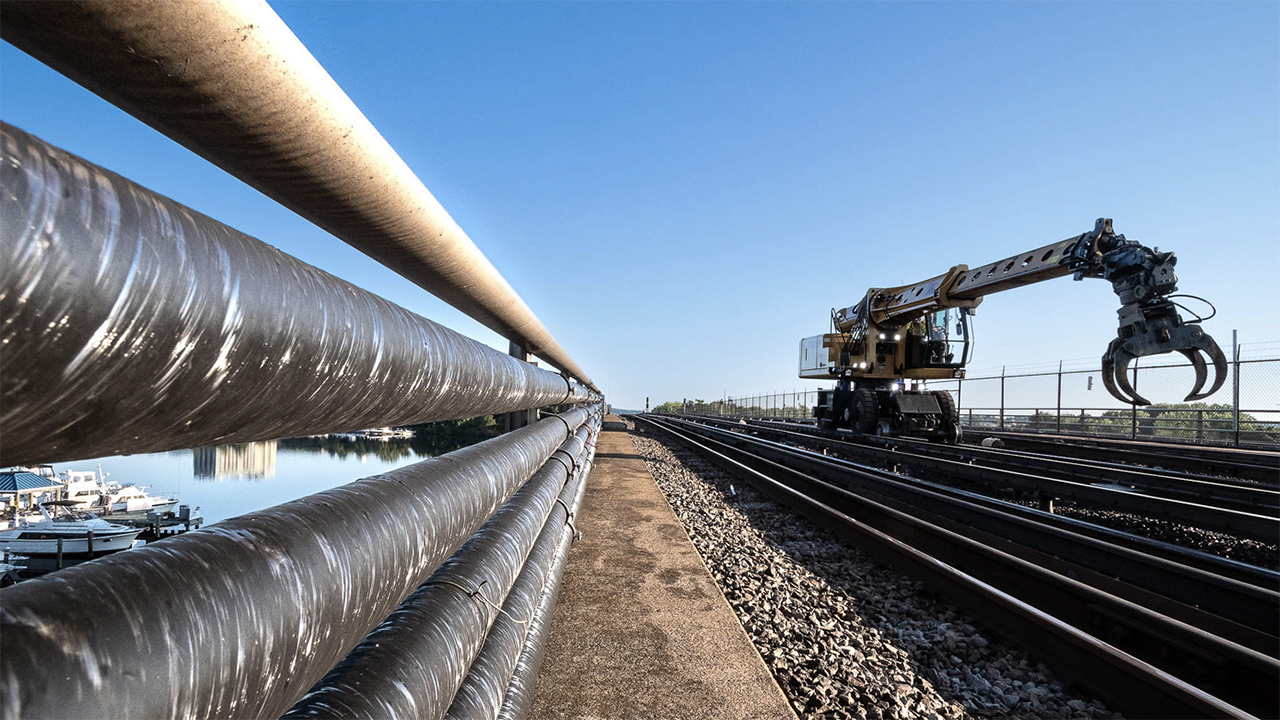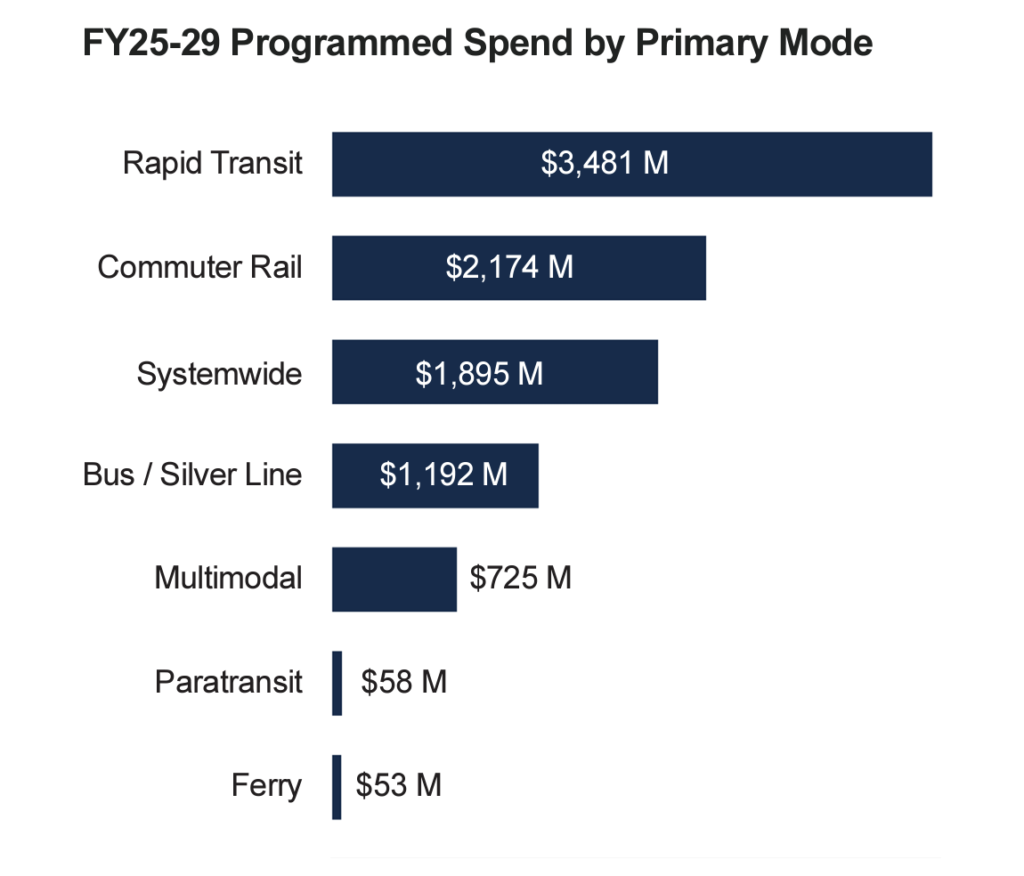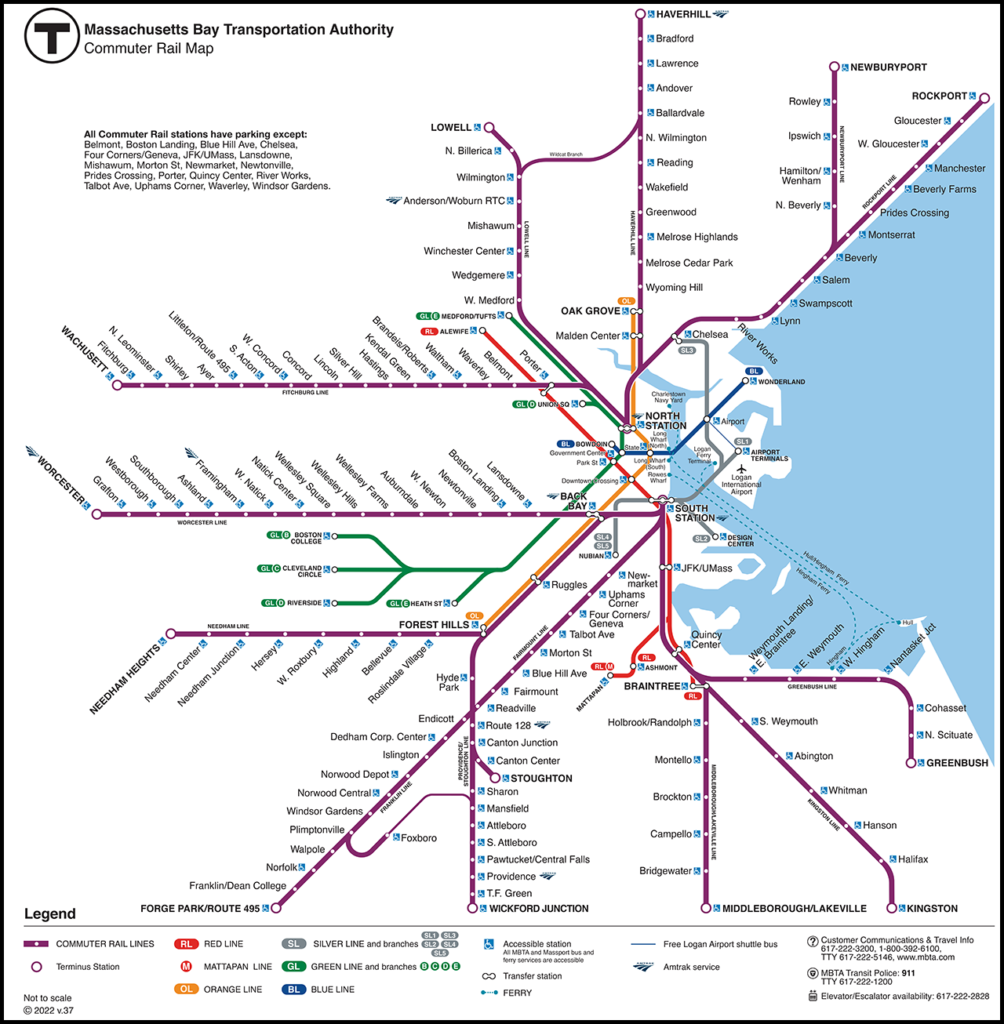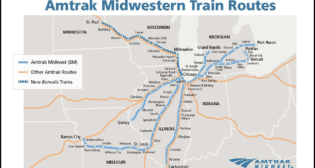
MBTA Issues Proposed $9.6B CIP, Extends Keolis Contract
Written by Marybeth Luczak, Executive Editor
(MBTA Photograph)
Massachusetts Bay Transportation Authority (MBTA) on April 25 released its proposed $9.6 billion FY 2025-29 Capital Investment Plan (CIP) and agreed to extend Keolis’ operations contract for its Commuter Rail network, which runs from Boston to Eastern Massachusetts and Rhode Island.
The CIP is a five-year financial plan that funds all of MBTA’s capital projects—investments or activities related to acquiring, renewing, constructing, improving, or maintaining a capital asset, including project planning and design. It is backed by a mix of federal, state, and local sources, as well as third-party reimbursements.
According to MBTA, the CIP is updated annually to ensure that the agency continues to:
- Focus on “key investment objectives, including safety, reliability, modernization, accessibility, sustainability, and resilience.”
- Address the “most critical asset needs as we strive to bring the system to a State of Good Repair.”
- Prioritize projects “that keep the agency on a path to better safety, service, and sustainability.”
The proposed FY 2024-29 CIP (download below) includes more than 630 unique projects slated to modernize, improve, and increase the safety and reliability of MBTA’s transit network. They account for a proposed programmed spend of $9.6 billion over the next five fiscal years, which includes $843 million in new funding assigned to both existing and new projects.
According to MBTA, key investments cover:

- Structure Improvements. Along with full funding for North Station Draw 1 Bridge Replacement, MBTA said it is investing in “urgent structural needs and life-extending bridge rehabilitation and repair, prioritized by asset condition and criticality.”
- Track Improvements. According to MBTA, “investments also focus on vital track upgrades, right-of-way access improvements, and measures to improve climate resiliency and redundancy” on the system.
- Station Improvements. MBTA is funding accessibility improvements on the Green Line, Commuter Rail, and Ferry “to ensure safe and accessible stations.” Programmed funds also target station inspections and repairs.
- Bus and Commuter Rail Modernization. MBTA is advancing capital efforts to support Bus Network Redesign and Bus Transit Priority, and funding infrastructure upgrades for decarbonized service on the Fairmount Line.
The proposed FY 2024-29 CIP also forecasts anticipated funding levels in future years, where MBTA said it “may be challenged to ensure that it stays on course to achieve its capital investment targets.”
Public input on the proposal is due before May 16, according to MBTA, which said the CIP will be further refined before being submitted to the MBTA Board of Directors for approval in June and taking effect in July.
“The MBTA’s five-year CIP is the framework that guides how the T plans critical investments in the system, and public feedback is invaluable to us as we prioritize and deliver critical work for the public we serve,” MBTA General Manager and CEO Phillip Eng said. “We understand our responsibility to make wise investments as we rebuild our system, providing improved, reliable, and safe service today while we also plan and strategically deliver capital projects that will serve the needs of future generations. I thank the Board of Directors for their thoughtful review, and I am excited about the future as we continue rebuilding our infrastructure into one that we all can be proud of.”
Release of the proposed FY 2025-29 CIP follows MBTA’s fall 2023 release of the Capital Needs Assessment and Inventory (CNAI), which estimated that approximately $24.5 billion would be needed to support the existing network’s state of good repair. Conducted every three-to-four years, the CNAI is an MBTA-led analysis to outline assets and overall system condition.

Meanwhile, WBUR radio in Boston reported that the MBTA Board on April 25 voted unanimously to extend Keolis Commuter Services’ contract for one year to mid-2027.
“MBTA officials in 2020 had agreed to extend the Keolis contract through June 30, 2026, with the option for another one-year extension,” the nonprofit news organization said. “T officials said the extra year will give the agency more time to reimagine the future of commuter rail service.”
According to WBUR, MBTA is now looking at different contract structures. In February, agency spokesman Joe Pesaturo told the news organization that “[t]here have been significant developments in passenger railroad technology and operations worldwide since the current [MBTA] structure was developed, and MBTA is considering whether different contractual structures may better serve the communities of Massachusetts … The plan for the next procurement is to identify a partner who can help deliver on this vision via a new, innovative operating contract structure.”
MBTA Commuter Rail is owned by MBTA, but operations are contracted out; “Amtrak had the contract in the 1980s, followed by the Massachusetts Bay Commuter Railroad Company, and the agency now has a contract with Keolis,” according to WBUR.
The agency in March released a Request for Information on contracts. WBUR said MBTA will decide on a new contract model by October; shortlist bidders by year-end 2024 and issue a final Request for Proposals by late-fall 2025. “They’re expecting to pick a new operator by fall of 2026—which coincides with the next gubernatorial election—and mobilize the transition in the first half of 2027,” the news organization said.



